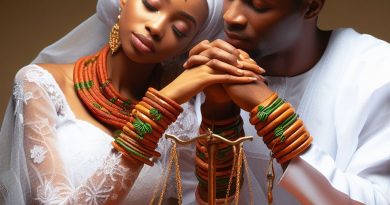Legal Aspects of Marriage: What Nigerians Should Know
Last Updated on January 28, 2024
Introduction
In Nigeria, marriage is a significant institution deeply rooted in culture, tradition, and religion.
Understanding the legal aspects of marriage is crucial for all Nigerians.
It ensures the rights and obligations of both parties are protected.
Brief overview of marriage in Nigeria
Marriage in Nigeria is recognized and regulated by various laws, including the Marriage Act, Customary Law, and the Islamic Law.
These laws govern aspects such as age consent, registration, dissolution, and property rights.
Importance of understanding the legal aspects of marriage
Understanding the legal aspects of marriage is essential for several reasons.
Firstly, it ensures that marriages are valid and legally binding under Nigerian law.
This protects both parties’ rights and interests.
Secondly, knowledge of the legal aspects allows couples to make informed decisions regarding marriage-related issues, such as property ownership, inheritance, and divorce.
Furthermore, understanding the legal aspects of marriage helps in resolving disputes and conflicts that may arise during the marriage.
It provides a legal framework for addressing issues such as maintenance, custody, and visitation rights for children.
Additionally, awareness of the legal aspects of marriage protects individuals from fraudulent practices, such as bigamy or forced marriages.
It enables individuals to identify potential red flags and seek appropriate legal remedies if necessary.
Gaining knowledge about the legal aspects of marriage in Nigeria is crucial.
It ensures that marriages are recognized and protected under the law, empowers individuals to make informed decisions, and safeguards their rights and interests throughout their marital journey.
Read: Couples of the Bible: Stories and Marriage Verses
Types of Legal Marriages in Nigeria
Customary Marriages
- Customary marriages in Nigeria are marriages recognized by the customs and traditions of the respective ethnic groups.
- These marriages have certain characteristics, such as payment of bride price and the involvement of family members.
- For a customary marriage to be legally recognized, it must meet certain requirements and follow specific procedures.
- The requirements often include obtaining consent from both families, performing traditional rites, and registering the marriage with the appropriate authorities.
- Meeting these requirements validates the customary marriage, making it legally valid and binding according to Nigerian law.
Statutory Marriages
- Civil marriages, termed statutory marriages, occur following the Marriage Act’s stipulations.
- A marriage registrar, judge, or licensed minister typically performs these marriages in the presence of witnesses.
- To make a statutory marriage legally valid in Nigeria, one must adhere to specific requirements and procedures.
- Some of the requirements include obtaining a marriage license, giving notice of intention to marry, and providing necessary documentation.
- To complete the process, the couple must solemnize the marriage in a recognized place of worship or a licensed venue.
- Once the statutory marriage is properly conducted and registered, it is considered legally recognized in Nigeria.
There are two types of legal marriages in Nigeria: customary marriages and statutory marriages.
Customary marriages follow ethnic customs, while statutory marriages adhere to the Marriage Act, each with unique requirements for legal recognition.
It is important for Nigerians to understand the differences and choose the type of marriage that best suits their preferences and beliefs.
Read: Heartfelt Marriage Prayers and Their Bible Origins
Key Legal Considerations for Nigerian Couples
Age requirement for marriage
In Nigeria, individuals must obey legal age limits before marrying.
According to the Marriage Act, the minimum age for marriage in Nigeria is 18 years old.
1. Minimum age for marriage in Nigeria
The law is in place to protect young individuals from entering into marriages they are not emotionally or mentally ready for.
It ensures that individuals have had enough time to mature and make informed decisions about marriage.
2. Legal consequences of underage marriage
If someone performs a marriage ceremony involving a person under 18, they can face legal consequences.
The law deems these marriages null and void, and it can charge individuals involved with an offense.
Consent and free will
Legal marriages in Nigeria require voluntary consent.
The law invalidates marriages entered into through force, coercion, or without free will.
1. Importance of voluntary consent
Voluntary consent ensures that both parties enter into the marriage willingly and without any external pressures.
It protects individuals from being forced into a marital union against their wishes.
2. Consequences of forced or coerced marriages
Forced or coerced marriages infringe upon an individual’s rights and can lead to various negative consequences.
These marriages often result in domestic violence, lack of marital harmony, and emotional distress for the parties involved.
Polygamy and monogamy
Nigeria culturally accepts polygamy, but the law imposes specific restrictions and considerations regarding it.
1. Legality and restrictions on polygamous marriages
The Marriage Act states that a man can enter into multiple marriages if he meets specific conditions.
However, the consent of all parties involved and permission from existing spouses are necessary for a lawful polygamous marriage.
2. Rights and obligations of spouses in polygamous marriages
In polygamous marriages, each spouse has rights and obligations towards one another.
However, it is important to note that the law protects the rights of all parties involved and ensures fair treatment and equal distribution of marital benefits.
Family rights and obligations
Marriage in Nigeria comes with certain family rights and obligations that couples must be aware of.
1. Property rights and inheritance laws
Spouses have certain rights to the property acquired during the marriage.
Inheritance laws dictate property distribution among the surviving spouse and children when one spouse dies.
2. Responsibilities towards children and families
Parents have legal responsibilities towards their children, including providing for their basic needs, education, and protection.
The law ensures that both parents contribute to the wellbeing and upbringing of their children, regardless of marital status.
Nigerian couples can protect their rights and obligations by comprehending these crucial legal considerations as they navigate marriage complexities.
Read: From Adam and Eve: Lessons on Marriage in the Bible

Find Out More: Marriage Proposal Etiquette: The Nigerian Perspective
Legal Protection and Dissolution of Marriage
Marriage certificates and legal proof
- Obtaining a marriage certificate is crucial for establishing the legal recognition of a marriage. A union might not be legally binding if it lacks a valid marriage certificate.
It is essential for couples to register their marriage with the appropriate government authority to obtain this legal proof. - Not having a marriage certificate can have significant legal implications. In the absence of a marriage certificate, disputes regarding the validity of a marriage may arise.
This can cause complications when dealing with legal matters such as inheritance, property rights, and spousal support.
Lack of legal proof can also pose challenges if the couple wishes to dissolve their marriage in the future.
Grounds and procedures for divorce
- Nigeria recognizes different types of divorce, including fault-based and no-fault divorce. Fault-based divorce requires proving that one spouse engaged in misconduct or acts that render the marriage intolerable. No-fault divorce, on the other hand, allows couples to dissolve their marriage without assigning blame to either party.
- To achieve legal recognition, one must adhere to specific requirements and follow prescribed procedures in divorce cases. These may vary depending on the type of divorce sought. Generally, spouses must demonstrate that the marriage has irretrievably broken down and that there is no possibility of reconciliation. They must also adhere to any waiting periods and attend mediation or counseling sessions, if required by law.
Legal rights and obligations after divorce
- After divorce, assets and properties acquired during the marriage are subject to division between the spouses. This typically involves a fair distribution of assets, taking into consideration factors such as each party’s financial contributions, the duration of the marriage, and the needs of any children involved.
- Authorities determine child custody and maintenance obligations based on the child’s best interests. Courts in Nigeria prioritize the welfare and care of the child when making decisions about custody and visitation. Courts may demand financial contributions from the non-custodial parent for the child’s upbringing and support.
Understanding the legal aspects of marriage is essential for Nigerians.
Obtaining a marriage certificate provides legal recognition, while not having one can lead to significant complications.
Divorce in Nigeria involves different grounds and procedures, and the legal rights and obligations after divorce center around the division of assets and properties, as well as child custody and maintenance.
Knowing these legal aspects empowers Nigerians to protect their rights and navigate marriage and divorce complexities more effectively.
Read: Grace, Love, and Unity: Biblical Keys for Marriage
Conclusion
Recap of Key Legal Aspects
In this blog post, we’ve journeyed through the essential legal facets of marriage in Nigeria.
From marriage registration to spousal rights, these legal dimensions underpin the foundation of marital unions in the country.
Importance of Legal Advice
Understanding your rights and responsibilities as a married couple is more than just a legal formality; it’s a shield against unforeseen challenges.
Seeking legal advice ensures you navigate these complexities with confidence.
Encouragement for Legal Knowledge
As you conclude this section, consider this a call to action.
Prioritize legal knowledge in your journey toward a successful and legally protected marriage.
By doing so, you not only fortify your union but also contribute to the broader understanding of the legal intricacies that govern marital life in Nigeria.
Legal awareness should form the bedrock of a flourishing, secure marriage, where love complements the safeguarding of rights and the acceptance of responsibilities.


